Nursing 401013: Analyzing Mental Health Risks and Interventions
VerifiedAdded on 2023/06/07
|5
|1206
|310
Homework Assignment
AI Summary
This assignment focuses on the application of nursing principles to address mental health concerns within a case study scenario. It identifies suicidal thoughts as an urgent risk, emphasizing the importance of a therapeutic relationship and family support. The assignment also addresses low mood as a key mental health concern, advocating for interventions that involve family and positive reinforcement. Furthermore, it discusses the ethical considerations of beneficence and confidentiality in nursing practice. The analysis is supported by relevant literature, providing a comprehensive understanding of mental health nursing interventions and ethical responsibilities. Desklib provides access to a wide range of solved assignments and study resources for nursing students.
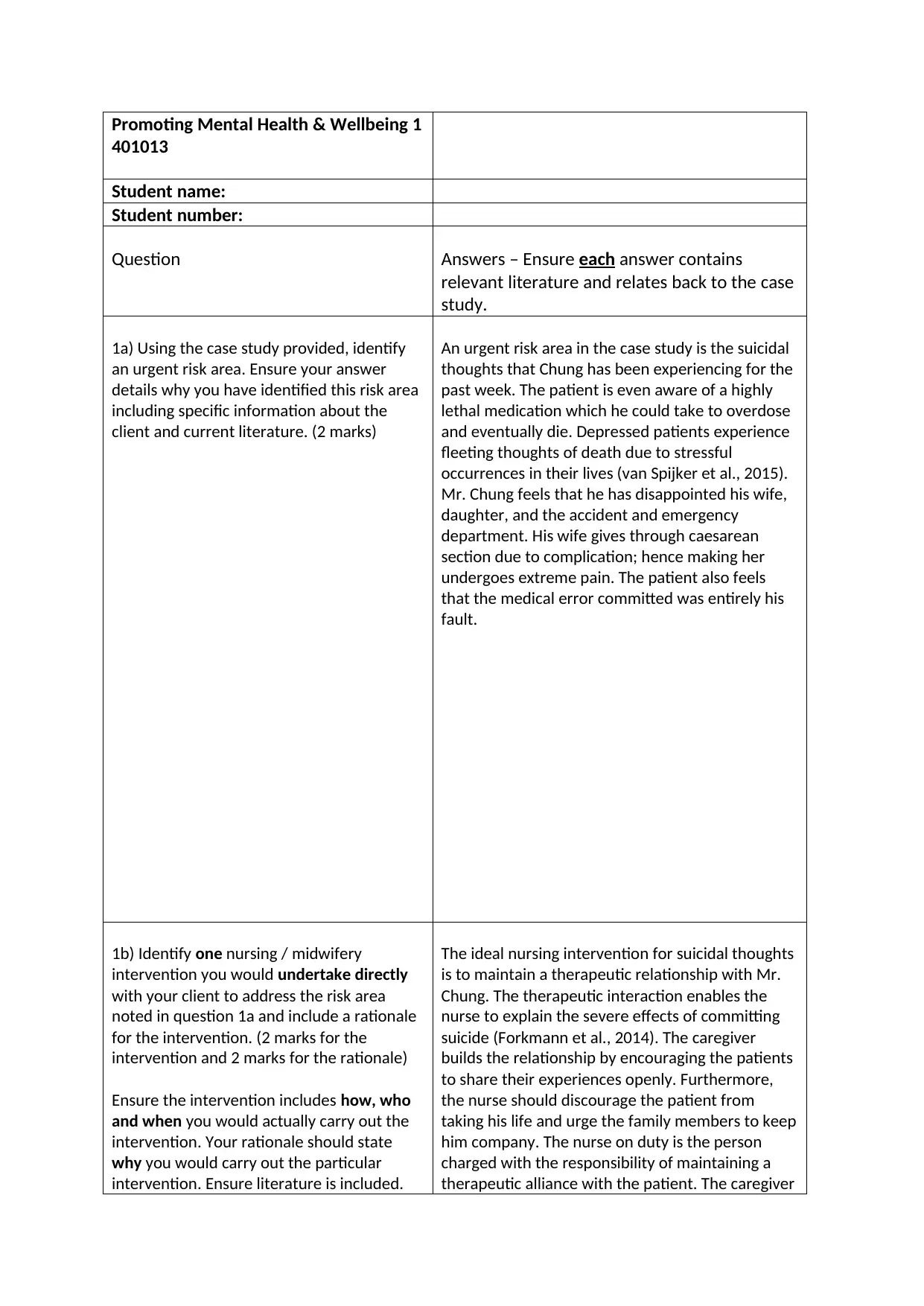
Promoting Mental Health & Wellbeing 1
401013
Student name:
Student number:
Question Answers – Ensure each answer contains
relevant literature and relates back to the case
study.
1a) Using the case study provided, identify
an urgent risk area. Ensure your answer
details why you have identified this risk area
including specific information about the
client and current literature. (2 marks)
An urgent risk area in the case study is the suicidal
thoughts that Chung has been experiencing for the
past week. The patient is even aware of a highly
lethal medication which he could take to overdose
and eventually die. Depressed patients experience
fleeting thoughts of death due to stressful
occurrences in their lives (van Spijker et al., 2015).
Mr. Chung feels that he has disappointed his wife,
daughter, and the accident and emergency
department. His wife gives through caesarean
section due to complication; hence making her
undergoes extreme pain. The patient also feels
that the medical error committed was entirely his
fault.
1b) Identify one nursing / midwifery
intervention you would undertake directly
with your client to address the risk area
noted in question 1a and include a rationale
for the intervention. (2 marks for the
intervention and 2 marks for the rationale)
Ensure the intervention includes how, who
and when you would actually carry out the
intervention. Your rationale should state
why you would carry out the particular
intervention. Ensure literature is included.
The ideal nursing intervention for suicidal thoughts
is to maintain a therapeutic relationship with Mr.
Chung. The therapeutic interaction enables the
nurse to explain the severe effects of committing
suicide (Forkmann et al., 2014). The caregiver
builds the relationship by encouraging the patients
to share their experiences openly. Furthermore,
the nurse should discourage the patient from
taking his life and urge the family members to keep
him company. The nurse on duty is the person
charged with the responsibility of maintaining a
therapeutic alliance with the patient. The caregiver
401013
Student name:
Student number:
Question Answers – Ensure each answer contains
relevant literature and relates back to the case
study.
1a) Using the case study provided, identify
an urgent risk area. Ensure your answer
details why you have identified this risk area
including specific information about the
client and current literature. (2 marks)
An urgent risk area in the case study is the suicidal
thoughts that Chung has been experiencing for the
past week. The patient is even aware of a highly
lethal medication which he could take to overdose
and eventually die. Depressed patients experience
fleeting thoughts of death due to stressful
occurrences in their lives (van Spijker et al., 2015).
Mr. Chung feels that he has disappointed his wife,
daughter, and the accident and emergency
department. His wife gives through caesarean
section due to complication; hence making her
undergoes extreme pain. The patient also feels
that the medical error committed was entirely his
fault.
1b) Identify one nursing / midwifery
intervention you would undertake directly
with your client to address the risk area
noted in question 1a and include a rationale
for the intervention. (2 marks for the
intervention and 2 marks for the rationale)
Ensure the intervention includes how, who
and when you would actually carry out the
intervention. Your rationale should state
why you would carry out the particular
intervention. Ensure literature is included.
The ideal nursing intervention for suicidal thoughts
is to maintain a therapeutic relationship with Mr.
Chung. The therapeutic interaction enables the
nurse to explain the severe effects of committing
suicide (Forkmann et al., 2014). The caregiver
builds the relationship by encouraging the patients
to share their experiences openly. Furthermore,
the nurse should discourage the patient from
taking his life and urge the family members to keep
him company. The nurse on duty is the person
charged with the responsibility of maintaining a
therapeutic alliance with the patient. The caregiver
Paraphrase This Document
Need a fresh take? Get an instant paraphrase of this document with our AI Paraphraser
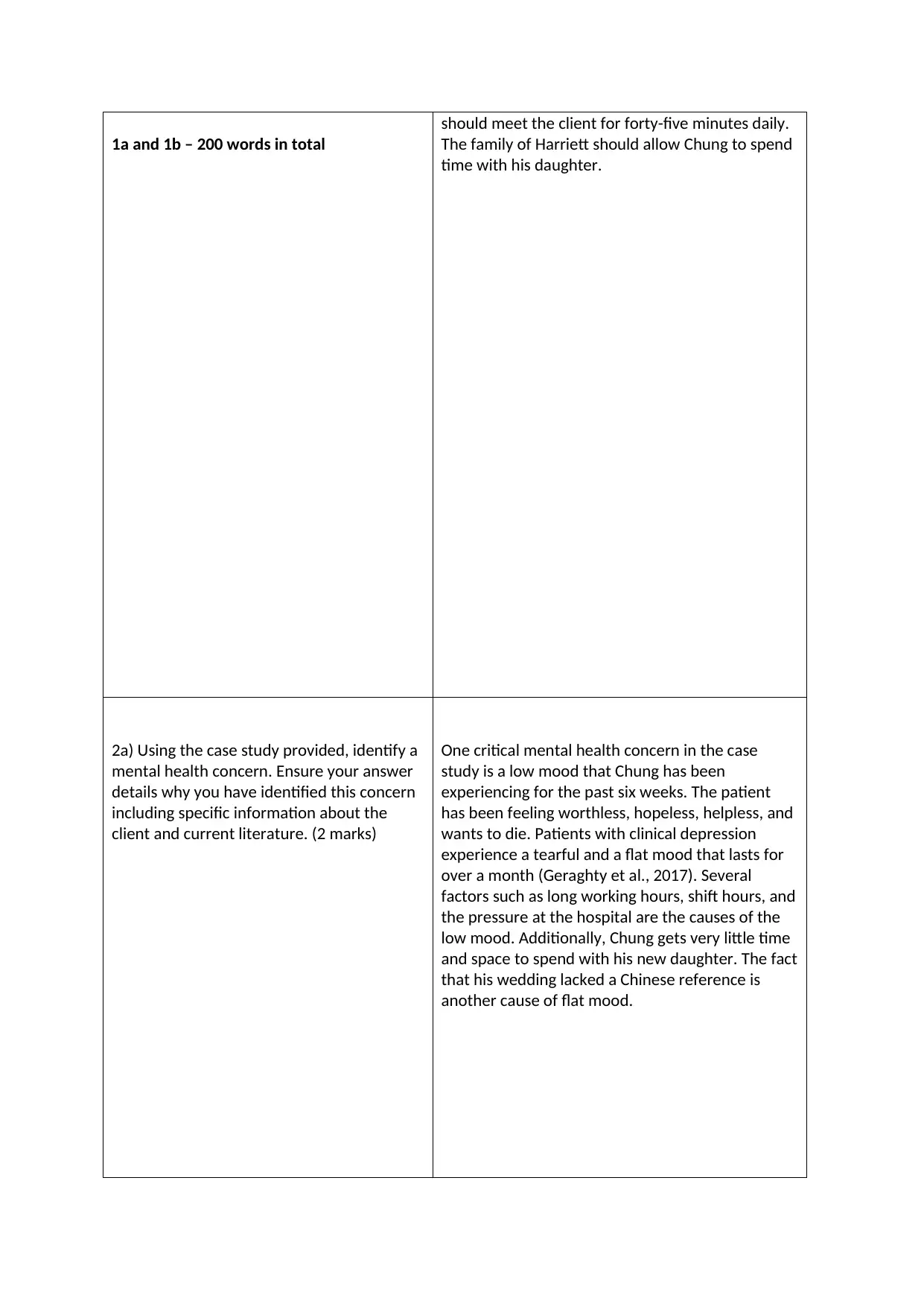
1a and 1b – 200 words in total
should meet the client for forty-five minutes daily.
The family of Harriett should allow Chung to spend
time with his daughter.
2a) Using the case study provided, identify a
mental health concern. Ensure your answer
details why you have identified this concern
including specific information about the
client and current literature. (2 marks)
One critical mental health concern in the case
study is a low mood that Chung has been
experiencing for the past six weeks. The patient
has been feeling worthless, hopeless, helpless, and
wants to die. Patients with clinical depression
experience a tearful and a flat mood that lasts for
over a month (Geraghty et al., 2017). Several
factors such as long working hours, shift hours, and
the pressure at the hospital are the causes of the
low mood. Additionally, Chung gets very little time
and space to spend with his new daughter. The fact
that his wedding lacked a Chinese reference is
another cause of flat mood.
should meet the client for forty-five minutes daily.
The family of Harriett should allow Chung to spend
time with his daughter.
2a) Using the case study provided, identify a
mental health concern. Ensure your answer
details why you have identified this concern
including specific information about the
client and current literature. (2 marks)
One critical mental health concern in the case
study is a low mood that Chung has been
experiencing for the past six weeks. The patient
has been feeling worthless, hopeless, helpless, and
wants to die. Patients with clinical depression
experience a tearful and a flat mood that lasts for
over a month (Geraghty et al., 2017). Several
factors such as long working hours, shift hours, and
the pressure at the hospital are the causes of the
low mood. Additionally, Chung gets very little time
and space to spend with his new daughter. The fact
that his wedding lacked a Chinese reference is
another cause of flat mood.
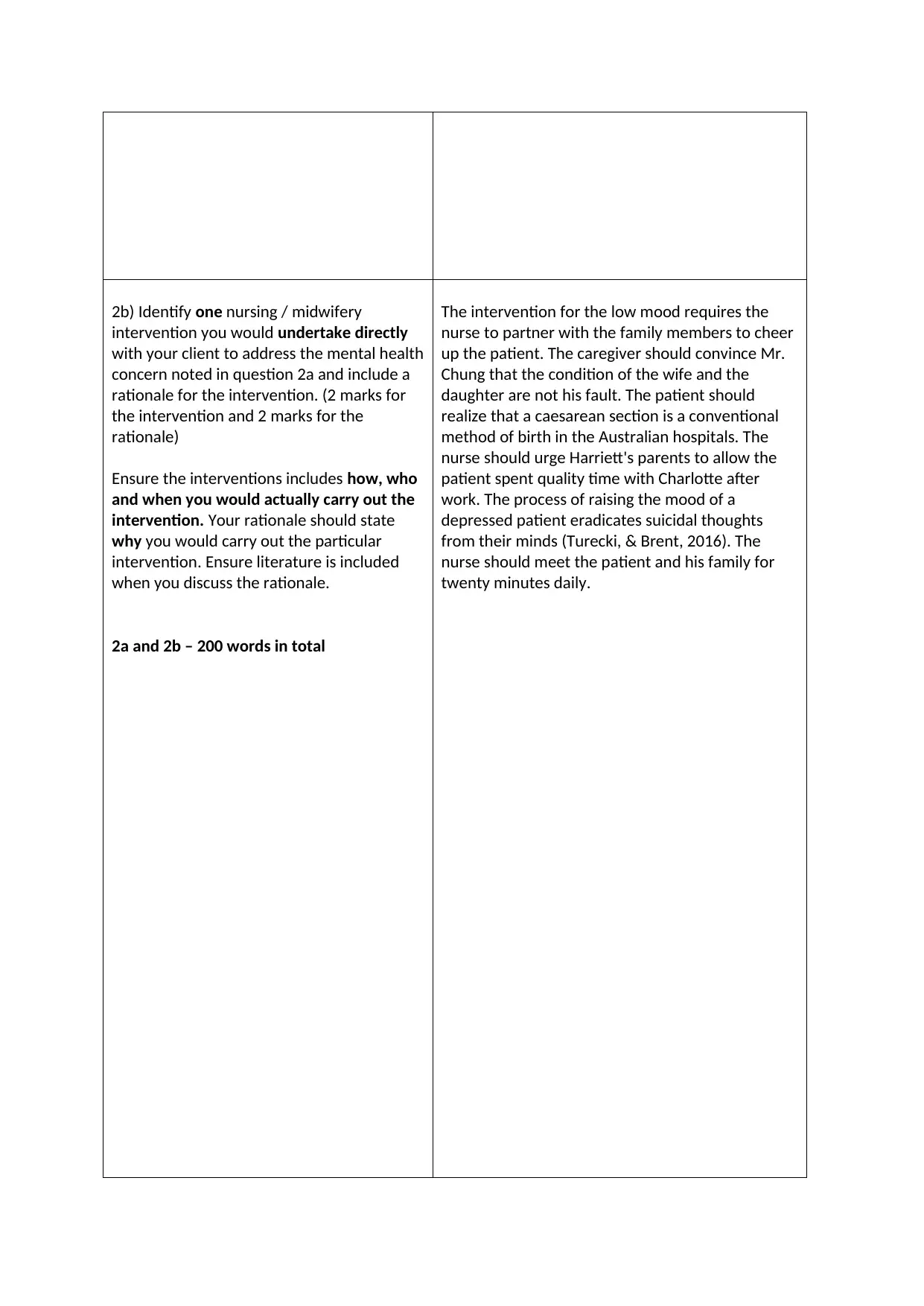
2b) Identify one nursing / midwifery
intervention you would undertake directly
with your client to address the mental health
concern noted in question 2a and include a
rationale for the intervention. (2 marks for
the intervention and 2 marks for the
rationale)
Ensure the interventions includes how, who
and when you would actually carry out the
intervention. Your rationale should state
why you would carry out the particular
intervention. Ensure literature is included
when you discuss the rationale.
2a and 2b – 200 words in total
The intervention for the low mood requires the
nurse to partner with the family members to cheer
up the patient. The caregiver should convince Mr.
Chung that the condition of the wife and the
daughter are not his fault. The patient should
realize that a caesarean section is a conventional
method of birth in the Australian hospitals. The
nurse should urge Harriett's parents to allow the
patient spent quality time with Charlotte after
work. The process of raising the mood of a
depressed patient eradicates suicidal thoughts
from their minds (Turecki, & Brent, 2016). The
nurse should meet the patient and his family for
twenty minutes daily.
intervention you would undertake directly
with your client to address the mental health
concern noted in question 2a and include a
rationale for the intervention. (2 marks for
the intervention and 2 marks for the
rationale)
Ensure the interventions includes how, who
and when you would actually carry out the
intervention. Your rationale should state
why you would carry out the particular
intervention. Ensure literature is included
when you discuss the rationale.
2a and 2b – 200 words in total
The intervention for the low mood requires the
nurse to partner with the family members to cheer
up the patient. The caregiver should convince Mr.
Chung that the condition of the wife and the
daughter are not his fault. The patient should
realize that a caesarean section is a conventional
method of birth in the Australian hospitals. The
nurse should urge Harriett's parents to allow the
patient spent quality time with Charlotte after
work. The process of raising the mood of a
depressed patient eradicates suicidal thoughts
from their minds (Turecki, & Brent, 2016). The
nurse should meet the patient and his family for
twenty minutes daily.
⊘ This is a preview!⊘
Do you want full access?
Subscribe today to unlock all pages.

Trusted by 1+ million students worldwide
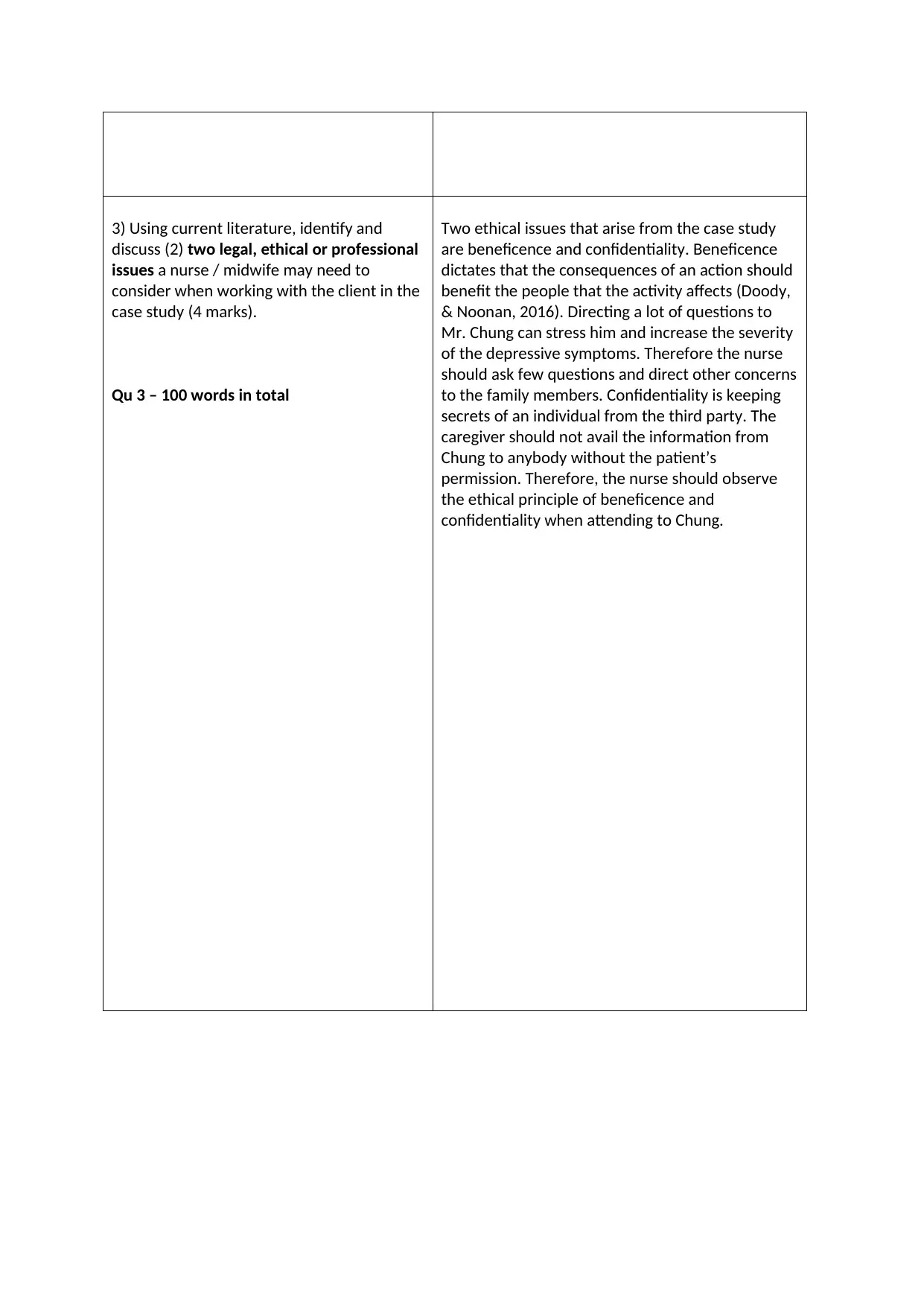
3) Using current literature, identify and
discuss (2) two legal, ethical or professional
issues a nurse / midwife may need to
consider when working with the client in the
case study (4 marks).
Qu 3 – 100 words in total
Two ethical issues that arise from the case study
are beneficence and confidentiality. Beneficence
dictates that the consequences of an action should
benefit the people that the activity affects (Doody,
& Noonan, 2016). Directing a lot of questions to
Mr. Chung can stress him and increase the severity
of the depressive symptoms. Therefore the nurse
should ask few questions and direct other concerns
to the family members. Confidentiality is keeping
secrets of an individual from the third party. The
caregiver should not avail the information from
Chung to anybody without the patient’s
permission. Therefore, the nurse should observe
the ethical principle of beneficence and
confidentiality when attending to Chung.
discuss (2) two legal, ethical or professional
issues a nurse / midwife may need to
consider when working with the client in the
case study (4 marks).
Qu 3 – 100 words in total
Two ethical issues that arise from the case study
are beneficence and confidentiality. Beneficence
dictates that the consequences of an action should
benefit the people that the activity affects (Doody,
& Noonan, 2016). Directing a lot of questions to
Mr. Chung can stress him and increase the severity
of the depressive symptoms. Therefore the nurse
should ask few questions and direct other concerns
to the family members. Confidentiality is keeping
secrets of an individual from the third party. The
caregiver should not avail the information from
Chung to anybody without the patient’s
permission. Therefore, the nurse should observe
the ethical principle of beneficence and
confidentiality when attending to Chung.
Paraphrase This Document
Need a fresh take? Get an instant paraphrase of this document with our AI Paraphraser
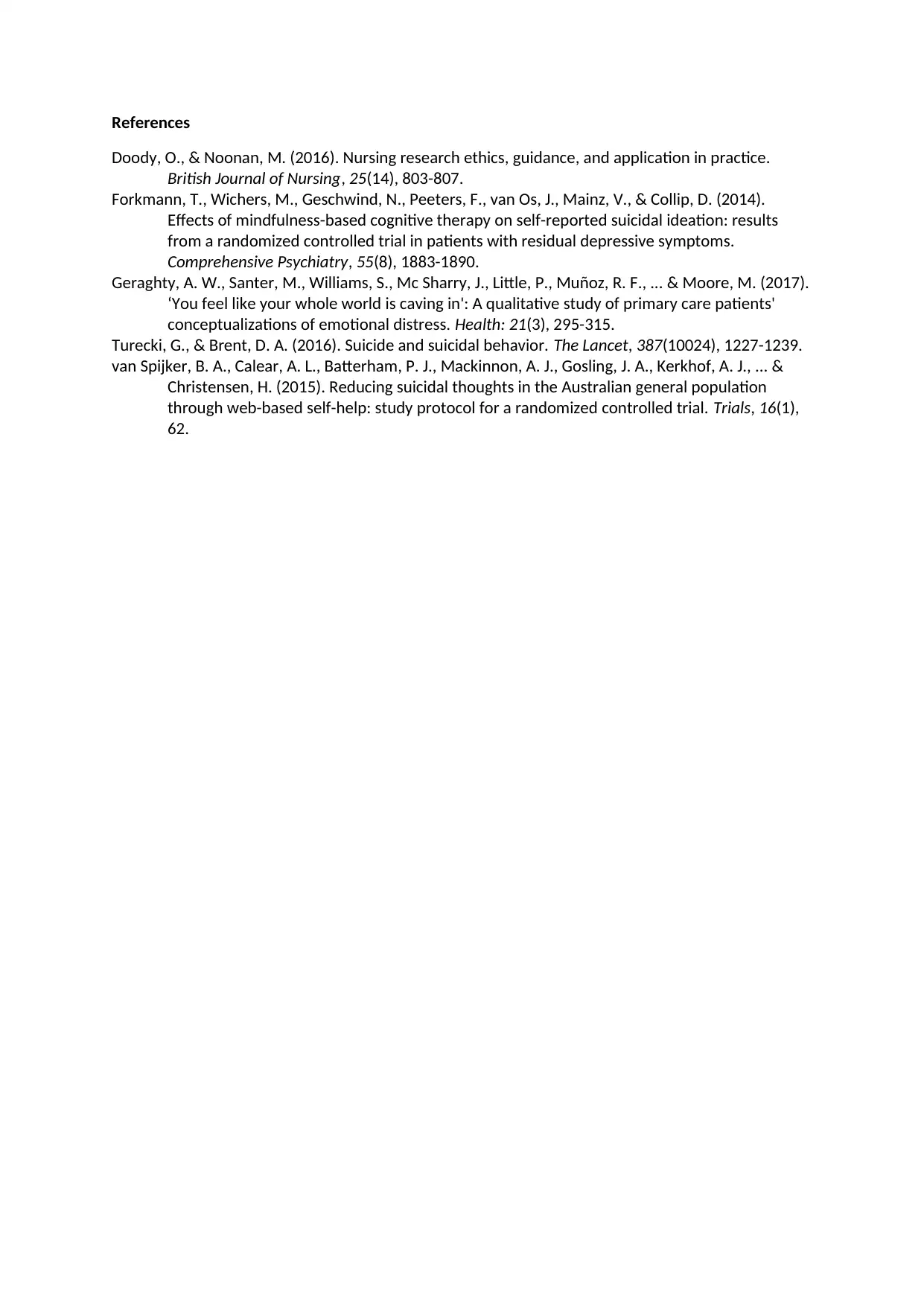
References
Doody, O., & Noonan, M. (2016). Nursing research ethics, guidance, and application in practice.
British Journal of Nursing, 25(14), 803-807.
Forkmann, T., Wichers, M., Geschwind, N., Peeters, F., van Os, J., Mainz, V., & Collip, D. (2014).
Effects of mindfulness-based cognitive therapy on self-reported suicidal ideation: results
from a randomized controlled trial in patients with residual depressive symptoms.
Comprehensive Psychiatry, 55(8), 1883-1890.
Geraghty, A. W., Santer, M., Williams, S., Mc Sharry, J., Little, P., Muñoz, R. F., ... & Moore, M. (2017).
‘You feel like your whole world is caving in': A qualitative study of primary care patients'
conceptualizations of emotional distress. Health: 21(3), 295-315.
Turecki, G., & Brent, D. A. (2016). Suicide and suicidal behavior. The Lancet, 387(10024), 1227-1239.
van Spijker, B. A., Calear, A. L., Batterham, P. J., Mackinnon, A. J., Gosling, J. A., Kerkhof, A. J., ... &
Christensen, H. (2015). Reducing suicidal thoughts in the Australian general population
through web-based self-help: study protocol for a randomized controlled trial. Trials, 16(1),
62.
Doody, O., & Noonan, M. (2016). Nursing research ethics, guidance, and application in practice.
British Journal of Nursing, 25(14), 803-807.
Forkmann, T., Wichers, M., Geschwind, N., Peeters, F., van Os, J., Mainz, V., & Collip, D. (2014).
Effects of mindfulness-based cognitive therapy on self-reported suicidal ideation: results
from a randomized controlled trial in patients with residual depressive symptoms.
Comprehensive Psychiatry, 55(8), 1883-1890.
Geraghty, A. W., Santer, M., Williams, S., Mc Sharry, J., Little, P., Muñoz, R. F., ... & Moore, M. (2017).
‘You feel like your whole world is caving in': A qualitative study of primary care patients'
conceptualizations of emotional distress. Health: 21(3), 295-315.
Turecki, G., & Brent, D. A. (2016). Suicide and suicidal behavior. The Lancet, 387(10024), 1227-1239.
van Spijker, B. A., Calear, A. L., Batterham, P. J., Mackinnon, A. J., Gosling, J. A., Kerkhof, A. J., ... &
Christensen, H. (2015). Reducing suicidal thoughts in the Australian general population
through web-based self-help: study protocol for a randomized controlled trial. Trials, 16(1),
62.
1 out of 5
Related Documents
Your All-in-One AI-Powered Toolkit for Academic Success.
+13062052269
info@desklib.com
Available 24*7 on WhatsApp / Email
![[object Object]](/_next/static/media/star-bottom.7253800d.svg)
Unlock your academic potential
Copyright © 2020–2026 A2Z Services. All Rights Reserved. Developed and managed by ZUCOL.





